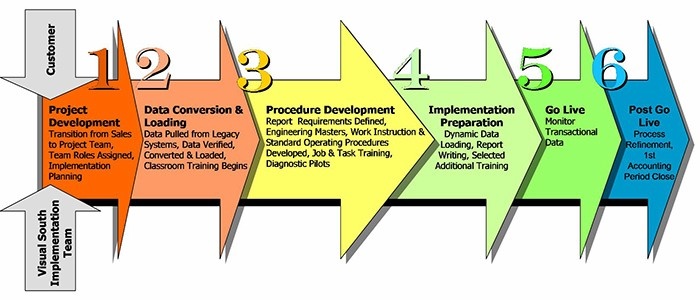ERP solutions don’t have everything
Evaluating Enterprise Resource Planning (ERP) systems is not an easy task. Naturally, your focus will probably be on finding a system that is a good match for your company. Much of the criteria used to judge the software will likely be based on what features and functions it has or doesn’t have. That’s reasonable, but limiting your evaluation to features and functions will not give you everything needed to make a great ERP decision for the company. To make a great decision, you also need to consider factors outside the ERP system.
Two things an ERP system does not include are the goals of the company and a plan to implement the solution. Take it from someone who has been in the software/manufacturing industry for over 30 years. (I haven’t seen everything, but I’ve seen a lot): Company goals and the implementation of the ERP solution are, at the very least, as important as software functionality.
Related: ERP Cloud vs. On-Premise
Related: What are the most used ERP modules?
Company goals
Aside from your goals related to the ERP and what you expect from it, you must consider the goals the company wants to achieve. An example of a goal would be to achieve an on-time shipping percentage of 99.9%. Notice how that goal is business related, not software related? The right ERP can be instrumental in helping companies reach their goals; but an ERP will not define the goals.
Company goals are critical to ERP selection because they are the means to evaluate the software and its fit for the organization. Each potential solution should be judged against the goals for the company. Don’t make the mistake of simply comparing potential ERP solutions against one another. This strategy will lead to many discussions and it will feel like something productive is being done; but a product comparison is not as productive as it seems because features alone can’t help a company reach its goals. It’s like the old adage in real estate: location, location, location. A house in a bad location isn’t a good buy just because it has a nice fireplace. If the goal is to live in a good location, fireplace style is less relevant.
Your ERP evaluation should focus on features/functionality and how those features will help the company attain its goals. This sounds so simple because it is. However, if a conscience effort isn’t made to stay focused, conversations will drift into software functionality and stay there. It happens all the time and is the leading cause of regret 12 months after the sale (based on my observations).
Solutions to problems are not goals
Warning: Solving problems is not the same as achieving goals! Goals transcend software. Achieving an on-time shipping percentage of 99.9% is a goal. To achieve this goal, multiple areas of the organization have to work in unison toward the goal. Printing out customer-specific labels for product shipments is not a goal. It’s one of hundreds of problems that need to be addressed. Hundreds of problems don’t bring clarity to what the company is trying to achieve. Goals bring clarity. Problems simply need to be addressed.
A plan to implement the ERP solution
Also, an ERP system does not include an implementation plan. ERP is useless unless it’s implemented properly. Just because you own paint, brushes, and a blank canvas does not mean you own a piece of art. You have the potential for a piece of art (unless I’m painting it), but you don’t have art. The same goes for an ERP that is installed but not implemented properly. There is potential, but that’s all there is.
In order to use an ERP software solution to its full potential, your organization will need to go through an implementation process. And it's not just about training employees how the software works. For training to take place at all, you must first develop processes that enable you to apply the software functionality to business needs. That’s where the work comes in. The current processes were developed based on the toolset the new ERP is replacing. New tools require new processes. The success of implementation is based more on the implementation partner’s talent and senior management’s level of investment in the solution—and less on the software features of the ERP.
It’s still important to choose the right ERP solution
There is one caveat to my last statement: Choosing the ERP that is the right fit for the company is still important. It’s just not the only factor in your overall success in the ERP project. Learn more about deciding on the right ERP solution by reading my eBook, How to Select the Right ERP…and not regret it.









